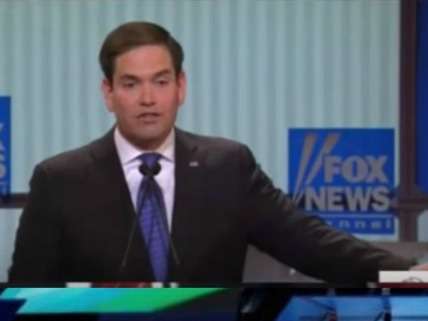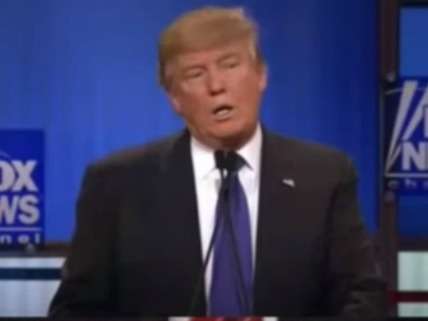Rubio Says Trump Is 'Not Conservative' but Can't Explain Why
The billionaire developer seems to support the principles that the Florida senator mentioned.

During last night's Republican presidential debate, Marco Rubio warned voters that Donald Trump is not really a conservative:
We are not going to turn over the conservative movement, or the party of Lincoln or Reagan…to someone whose positions are not conservative. To someone who last week defended Planned Parenthood for 30 seconds on a debate stage. To someone, for example, that has no ideas on foreign—someone who thinks the nuclear triad is a rock band from the 1980s. To someone who time and again on issue after issue has not proven that he has the principles that outline what the conservative movement has been about—and, as Ted said, the things that made America great. America is great because of the conservative principles of limited government and free enterprise, and a strong national defense.

The claim that Trump does not stand for conservative principles is often heard from Republicans who are dismayed that he is on the verge of becoming their next presidential candidate. But it is not clear what this charge means—partly because, as Nick Gillespie notes, it's not clear what conservative means in this context. To anyone who takes principles seriously, the positions commonly associated with the conservative movement (or the Republican Party) seem like a mishmash, much like the positions commonly associated with the progressive movement (or the Democratic Party). If you think the right to armed self-defense is important, then of course you want to ban abortion. If you believe in free trade, then obviously you want to suppress commerce in sexual services and arbitrarily proscribed intoxicants. Because there is no logic there, you just have to memorize the views that are supposed to go together, in the same way that you memorize the names of musicians in a band or players on a team.
Rubio mentioned "a strong national defense." But since no one wants a weak national defense, that phrase must be decoded. In practice it means that regardless of how much money the U.S. government is spending on the military, a conservative wants to spend more. I know: That doesn't sound conservative, but you can't get hung up on words and their meanings if you want to understand this stuff. The point is, conservatives want to spend more on the military, and Donald Trump doesn't, so he is not a real conservative.
Except that Trump says in a campaign video, "I'm gonna make our military so powerful, so strong, that nobody—absolutely nobody—is gonna mess with us." On Face the Nation last October, he said, "I want to have a much stronger military." So "strong national defense," check.
What about "limited government"? Again, forget that always wanting to expand so-called defense spending seems inconsistent with that principle. Does Trump talk about making government smaller? Yes, he does. Just last night, he talked about cutting federal spending by $300 billion a year. He said he would reduce entire agencies and departments to "little tidbits," and he made a Reaganesque promise to eliminate "waste, fraud, and abuse." Never mind that his numbers don't add up. Did Reagan's numbers add up? Did George W. Bush's? Would Rubio say these guys were not real conservatives? So "limited government," check.
As for "free enterprise," it should go without saying that a successful businessman like Trump is a fan. True, he talks tough on trade, but so does Rubio. Plus Trump promises to stimulate the economy by cutting everyone's taxes, thereby becoming "the greatest jobs-producing president that God ever created." Aren't conservatives all about creating jobs by cutting taxes? So "free enterprise," check.
Rubio also implicitly took aim at Trump's position on abortion. Trump forthrightly admits that he has "evolved" on abortion. So did Ronald Reagan and Mitt Romney. If they were conservative enough to be the Republican presidential nominee, why isn't Trump?


Show Comments (29)